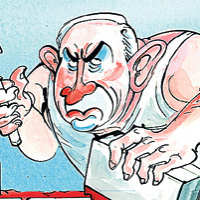![]()
Wed, Aug 01, 2012 | RubinReports | By Barry Rubin

Mitt Romney, seen on screen, speaks before the American Israel Public Affairs Committee, via satellite in Washington, on March 6, 2012. (Image via bloomberg.com)
There are some broad and important political issues raised by a minor flap concerning presidential candidate Mitt Romney’s visit to Israel. To look at these questions in a detached and honest way can tell us a lot about the future of the world and of U.S. policy.
The controversy began when Romney said at a meeting with donors:
As you come here and you see the GDP per capita, for instance, in Israel which is about $21,000 dollars, and compare that with the GDP per capita just across the areas managed by the Palestinian Authority, which is more like $10,000 per capita, you notice such a dramatically stark difference in economic vitality.
Romney said the economic history of the world has shown that “culture makes all the difference.”
Palestinian leaders complained, saying that this showed Romney was racist and out of touch with the realities of the Middle East. Actually, their reaction showed that they are counterproductive leaders who are out of touch with the realities of the Middle East and human history.
The basis of the complaint is two-fold:
First, is a reference to culture in some way “racist” and why is Israel so far ahead of the Palestinians?
Racism refers to a belief that some people are inherently and biologically inferior. Consequently, nothing that they do can alter their inevitable backwardness.
This has nothing to do with culture, which is an alterable state of being. Indeed, racism has been disproven precisely because of the abilities of society to change their culture. Once, the Britons were a bunch of barbarian tribes who endlessly warred on each other and painted themselves blue. They have progressed considerably since then. (Joke: And yes, I have been at British football/soccer games and still believe it.)
Countries like China, Japan, South Korea, India, and Singapore — to restrict oneself to Asia alone — have dramatically developed in the last half-century. They kept many aspects of their culture and society while altering others. In America, the descendants of slaves brought unwillingly from Africa have proven able to accomplish a full range of technological, cultural, professional, and other things.
So it is never racist to state the reality that some societies at any given time are in advance of others; you are only racist if you say that this can never change. In other words, if Arabs decided to do certain things, they could be just as prosperous and developed as Israel, or America, or anyone else.
Unfortunately, though, and with some exceptions — particularly in the smaller Persian Gulf oil-rich sheikdoms — Arab polities and societies are changing in the wrong way. Both Romney and President Barack Obama have spoken of being on the “right side of history,” but the phrase would better be on the “right direction of history.”
But since Palestinian Authority leaders want to discuss culture, here’s one out of thousands of examples. Recently, at a cultural performance whose audience included the PA minister of culture, the songs and poetry spoke of how the main priority of raising children is to make sure they were ready to use guns — not computers — against you-know-who. And Hamas, which governs the Gaza Strip, holds summer camps where thousands of young people are encouraged to grow up to be suicide bombers and terrorists.
By heading toward Islamism, increased ethnic strife, and Sunni-Shia conflict, most of the Arab polities are either going backwards in time or being threatened by neighbors who are doing so. This ensures that the gap will not only remain, but become larger. Arab and Iranian liberal dissidents have the right ideas but are losing the battle.
Now here’s the problem: If Palestinians deny that there’s a problem, they cannot resolve the problem. Failure to acknowledge that there is a real difference is disastrous for the Palestinians. Insisting on the very ideas responsible for that difference is catastrophic.
When Romney refers to “culture,” he’s not referring to literature and music but to what is usually called “political culture.” And Romney uses the precise same criteria when he’s talking about America. Democracy, individual liberty, free enterprise, and the rule of law are among the ingredients necessary for success of any society.
Ironically, Romney actually understated the economic differences. In 2011, Israel’s per capita gross domestic product was about $31,000, while that of the West Bank and Gaza Strip was just over $1,500. If he was being so nasty, why did he underestimate the Israeli figure by 33 percent and overestimate the Palestinian number by about 700 percent?! What would they have said if he had given the real numbers?
Now, one way of explaining this gap is to talk about the sources of economic progress. What’s the alternative? For the Palestinians, as in the American debate, the answer is: victimization. And being part of the “victimization” side, the Associated Press agrees with the Palestinians, claiming that Romney’s:
Comparison of the two economies did not take into account the stifling effect the Israeli occupation has had on the Palestinian economy in the West Bank, Gaza Strip and east Jerusalem — areas Israel captured in 1967 where the Palestinians hope to establish a state.
In the West Bank, Palestinians have only limited self-rule. Israel controls all border crossings in and out of the territory, and continues to restrict Palestinian trade and movement. Israel annexed east Jerusalem in 1967, but has invested much less heavily there than in Jewish west Jerusalem.
And although Israel withdrew from the Gaza Strip in 2005, it continues to control access and has enforced a crippling border blockade since the Islamic militant Hamas seized the territory in 2007.
The World Bank and the International Monetary Fund repeatedly have said that the Palestinian economy can only grow if Israel lifts those restrictions.
I have quoted this at length so that when I say that this is utterly lies and rubbish you will have heard both sides. Note, however, that the AP did not present the other side.
The fact is that in economic terms the West Bank and Gaza Strip did well in the years of occupation, as can be statistically documented, except during periods of high-level, Palestinian-initiated violence. Especially egregious is that the AP highlights a blockade on the Gaza Strip without explaining why that happened. How can Hamas be a victim if you are the perpetrator of the problem by continuous rocket, mortar, and cross-border attacks against Israel?
In addition, by turning to violence instead of negotiating — remember the Palestinians could have negotiated a two-state solution as early as the late 1970s after Egyptian President Anwar al-Sadat’s initiative — they damaged their own situation. Repeated intifadas, terrorism, corruption, and the Hamas-Fatah war, plus Hamas’s attacks on Israel, have a lot more to do with economic damage than anything Israel has done. Why were there once tens of thousands of Palestinians earning good money by working in Israel daily, and now only a handful? Racial discrimination or the fact that some used the opportunity to commit terrorist violence?
Far from being victims, the Palestinians have been coddled by the international community for more than two decades. The Palestinian Authority has not been held responsible for corruption and squandering money, behavior that had no effect on the flow of proportionally huge cash payments. Nor has it been punished politically for its incitement and intransigence. And it refuses to resettle people from refugee camps into regular housing. Only Palestinians in all the world receive refugee status and UN welfare payments over many generations.
While Israeli economic pressure has played a role, Israel has also transferred millions of dollars of customs and other payments to the PA while always opposing cut-offs in international aid because that might destabilize the Palestinian regime and lead to even more violence. Moreover, World Bank and International Monetary Fund reports have repeatedly said that such pressures were a relatively secondary factor in comparison to the internal flaws of the Palestinian governments and economy. In other words, the Associated Press has dishonestly misrepresented the contents of the reports.
And finally there is one simple, decisive argument. Egypt, Jordan, Lebanon, and Syria, for example, have not been under Israeli occupation. So why haven’t they flourished?
Whining eternally that you are a victim and putting your priority on getting sympathy and hand-outs get in the way of doing what’s necessary to start being successful. Those Third World peoples and countries who have learned these lessons have done well; those who haven’t done so have become basket cases.
The bottom line is this: Romney is bringing us back to the proper argument on the causes of economic development and stagnation. Indeed, his standpoint is the same as post-colonial liberal development theory in the era before radicals, drawing on Lenin and Marxist ideology, redefined it by blaming everything on some endless imperialism.
Romney’s points also apply to America as well as to the Middle East. The main problem is not Israel, or capitalism, or a racial group meanly oppressing someone else, but on bad and undemocratic governance along with demagogic leaders encouraging their followers to adopt behavior not conducive with progress and prosperity.
And what can we say of the Western intellectuals, “experts,” journalists, and politicians who encourage the Third World and many other groups to continue going down the road of poverty, hatred, violence, and instability?
Note: A large number of mainstream media outlets and columnists have attacked Romney for his statement mainly, echoing the AP story, because he didn’t talk about the negative effects of Israeli policy on the Palestinian economy. Because, you see, nobody can be successful and prosperous unless they stole it from others.
To my knowledge not a single one pointed out:
- Statistics showing major advances during the period of Israeli occupation;
- Palestinian violence has been the main cause of Israeli roadblocks and interventions;
- A comparison to non-oil rich Arab countries showing that the Palestinian Authority has not done at all badly in comparison to those where Israel had no effect;
- The massive corruption and incompetence of the PA;
- The massive inflow of international aid to the Palestinians; and
- The large transfer of funds (as provided in the Oslo agreement but PA behavior did not make Israel violate the agreement) from Israel to the PA regarding refunds on customs duties and workers’ fringe benefits.
This is how shameless the coverage is on these issues. It’s funny to think that only a couple of months ago, the same media outlets were talking about a big economic boom on the West Bank.



 RSS
RSS










Latest Comments
Hello Mike, Thank you for your positive feedback to the article. I felt there wasn’t too much critical analysis of ...
Thanks for this considered and well constructed article. A follow up article on the manner in which the editorial contro...
THE CLUELESSNESS OF CLAIMING THAT OBAMA'S MIDDLE EAST POLICIES WERE A FAILURE CANNOT BE FURTHER FROM THE TRUTH, WHAT THE...
As long as Obama is the president of the usa do not trust the us government......
Thank you for an good read....